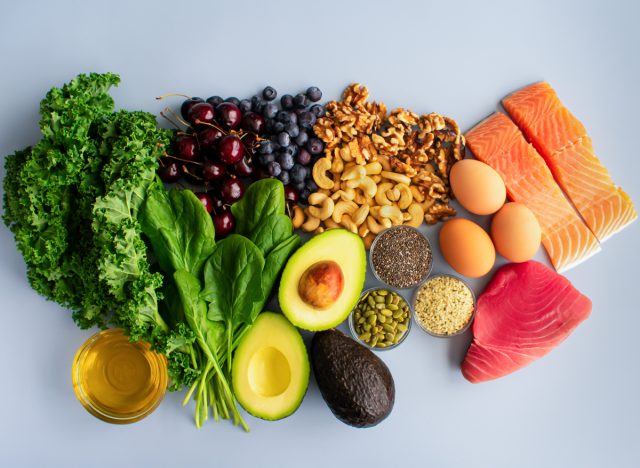6 Habits That Can Make Your Brain Younger

Aging can be a beautiful part of life to fully embrace. It comes with years of experience and wisdom, along with building up hobbies, passions, relationships, and a career for yourself. But there are some parts of growing older that are a bit more challenging to accept. Mike Bohl, MD, MPH, ALM, a member of our Medical Expert Board and a certified personal trainer and nutrition coach, explains, "There's a more worrying component of aging—the gradual decline of the body. And while many people may focus on the physical aspects of aging—such as feeling more fatigued or getting arthritis—there are also mental components to aging—such as cognitive decline." Today, Dr. Bohl shares with us six habits that can make your brain younger so you can combat the side effects of aging.
There's nothing you can do to turn back the clock and change your actual age, but there is much to learn about aging better. Dr. Bohl explains, "There's a more worrying component of aging—the gradual decline of the body. And while many people may focus on the physical aspects of aging—such as feeling more fatigued or getting arthritis—there are also mental components to aging—such as cognitive decline." This can be very daunting when it comes to knowing exactly how to keep your brain feeling healthy and youthful.
Interestingly enough, it's believed by some researchers that keeping the mind active is an effective way to protect it from damage and aging, and also increase its cognitive reserve. "The higher the cognitive reserve, the later cognitive decline may start or the later the effects of cognitive decline may be noticeable. This means that keeping the brain active and building up cognitive reserve may not entirely prevent dementia, but it could extend the amount of time somebody has before dementia noticeably impacts them," explains Dr. Bohl.
You can do many beneficial things to maintain your physical wellness and boost your brain health. Dr. Bohl recommends six habits that may be helpful in keeping your cognitive abilities functioning well. Keep reading for six habits that can make the brain younger.
Eating a healthy diet

Not only does maintaining a nutritious diet help manage your weight—it also ensures you get the right amount of nutrients and energy each day. Dr. Bohl points out, "It's important to eat enough healthy carbohydrates (like whole grains) to supply the brain with glucose—its primary energy source. And the risk of some nutrient deficiencies increases with older age—some of which are associated with cognitive decline—so eating a varied diet with fruits and vegetables is important." And of course, include healthy fats (including polyunsaturated and monounsaturated fats) in addition to lean proteins (such as fish, chicken, and plant-based proteins) in your diet.
Exercising the right amount of time each week

It's recommended that every adult performs a minimum of 150 minutes of aerobic exercise at a moderate intensity (or 75 minutes at a vigorous intensity) every week, in addition to strength training. Exercise is essential for a healthy brain and blood vessels, Dr. Bohl tells us. The result? A lower chance of microvascular disease because of better blood flow to the brain.
Getting sufficient sleep

Typically, older adults require less sleep than younger individuals. Sleeping enough is essential because it's when your brain performs many of its restorative functions. In addition, according to Johns Hopkins Medicine, getting a sufficient amount of healthy rest is crucial in helping your brain acclimate itself to input, and it decreases your chances of suffering from health risks. Needless to say, solid sleep will help your brain feel younger, Dr. Bohl says.
Stimulating your brain with activities

Plan activities to stimulate your brain. Dr. Bohl suggests, "Learning something new, working on puzzles, and challenging yourself every day are all ways to keep your brain engaged and build new synapses—the connections between brain cells."
Practicing mindfulness

"Meditation and mindfulness have been shown to improve some aspects of cognition and can also be used to help manage mental health," according to Dr. Bohl.
Research reveals just how beneficial establishing a mindfulness practice can be as you grow older. According to research conducted by the University of the Sunshine Coast, Australia, healthy adults above the age of 60 who practiced mindfulness for a six-month timeframe experienced enhanced sustained attention.
Socializing

Getting out and socializing works wonders for your brain! Plus, catching up with friends and loved ones can give you a major mood boost. Dr. Bohl explains, "Some research suggests that being more social can support brain health and may help reduce the risk of dementia, so try to fit a social activity into every day—even just calling a friend on the phone could help."









